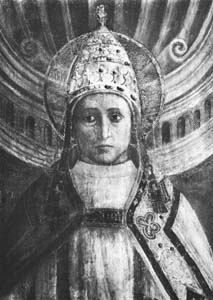
Feastday: December 20
Death: 217
Little is known about St. Zephyrinus, who was pope of Rome from c. 198 or 199 until 217. The antipope who opposed him, Hippolytus, says he was a simple and avaricious man. He adds that Zephyrinus relied too much on his deacon, Callixtus, who was in charge of the church's cemetary. Zephyrinus battled the heresies of adoptionism, modalism, and monarchianism; the antipope also accuses him of being a modalist.
Pope and Bishop of Rome from 199 to 217
Pope Zephyrinus was the fifteenth bishop of Rome from 199 to his death on 20 December 217. He was born in Rome, and succeeded Victor I. Upon his death on 20 December 217, he was succeeded by his principal advisor, Callixtus I. He is known for combatting heresies and defending the divinity of Christ.
Papacy
During the 18-year pontificate of Zephyrinus, the young Church endured persecution under the Emperor Severus until his death in the year 211. To quote Alban Butler, "this holy pastor was the support and comfort of the distressed flock". According to St. Optatus, Zephyrinus also combated new heresies and apostasies, chief of which were Marcion, Praxeas, Valentine and the Montanists. Eusebius insists that Zephyrinus fought vigorously against the blasphemies of the two Theodotuses, who in response treated him with contempt, but later called him the greatest defender of the divinity of Christ. Although he was not physically martyred for the faith, his suffering – both mental and spiritual – during his pontificate have earned him the title of martyr, a title that was repealed 132 years after his death.
Conflicts
During the reign of the Emperor Severus (193–211), relations with the young Christian Church deteriorated, and in 202 or 203 the edict of persecution appeared which forbade conversion to Christianity under the severest penalties.
Zephyrinus's predecessor Pope Victor I had excommunicated Theodotus the Tanner for reviving a heresy that Christ only became God after His Resurrection. Theodotus' followers formed a separate heretical community at Rome ruled by another Theodotus, the Money Changer, and Asclepiodotus. Natalius, who was tortured for his faith during the persecution, was persuaded by Asclepiodotus to become a bishop in their sect in exchange for a monthly stipend of 150 denarii. Natalius then reportedly experienced several visions warning him to abandon these heretics. According to an anonymous work entitled The Little Labyrinth quoted by Eusebius, Natalius was whipped a whole night by an angel; the next day he donned sackcloth and ashes, and weeping bitterly threw himself at the feet of Zephyrinus.
Feast day
A feast of St Zephyrinus, Pope and Martyr, held on 26 August, was inserted in the General Roman Calendar in the 13th century, but was removed in the 1969 revision, since he was not a martyr and 26 August is not the anniversary of his death which is 20 December, the day under which he is now mentioned in the Roman Martyrology. His feast is currently celebrated on 26 August in the Extraordinary Form of the Roman Rite.





